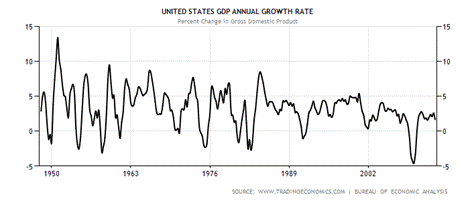
We know who will be the real victims of the cuts in government spending brought on by the sequester agreement, and wealth holders' insistence on lower taxes. It's the next generation; our children. For who suffers most from the precipitous decline in household wealth of the Great Recession -- from the decline in public services of the police, fire, schools, a warming environment and decrepit infrastructure brought on by continued budget cuts at a time when the economy is barely recovered?
The books and movie of the Hunger Games was a look into a possible future, where children can no longer depend on their parents for a secure future, where government is ruled by the wealthy few and corporations control the distribution of wealth. The result is back to a more primitive Darwinian world that our children are already seeing in such as the very popular Hunger Games -- a brutal world where only the fittest survive.

Graph: TradingEconomics
We now know why the U.S. average annual GDP growth rate has been trending down since the 1970s -- currently 2.2 percent, vs. the 3.5 percent average that prevailed even through the 1990s. It is directly related to the huge growth in income inequality that puts us near the bottom of both developed and developing countries (in 96th place), according to the CIA's World Factbook.
Since the 1970s, Republican economic policies have prevailed that diverted most of the fruits of prosperity to the wealthiest, so that the rest of U.S. have less to spend -- even though consumer spending drives 70 percent of economic activity.
The best expositor of Republican economic (and cultural) policies was GW Bush's Senior Political Advisor Karl Rove, the Karl Rove of Bush's Brain who yearned for a conservative Republican dynasty, modeled after 19th century President William McKinley (1896 to 1901), the supporter of monopolies and cartels, as well as extending American power. And such policies have partially succeeded, with record corporate profits that has resulted in a cash hoard of some $4.97 trillion, according to the St. Louis Federal Reserve Bank.
Graph: St. Louis Fed
As Paul Krugman has said countless times: "And why are we short changing the future so dramatically and inexcusably? Blame the deficit scolds," said Krugman, "...whose constant inveighing against the risks of government borrowing, by undercutting political support for public investment and job creation, has done far more to cheat our children than deficits ever did."
Berkeley Econ Professor Brad Delong has made the most heartfelt plea against shortchanging our future.
"I had always thought that policy makers well understood the basic principle of macroeconomic management," said this Economics Professor. "It was that the government's proper role was...to tweak asset supplies so that there were sufficient liquid assets, enough safe assets, and enough financial savings vehicles that the economy as a whole did not feel under pressure to de-leverage, and so push production below potential output."
"This principle has gone out the window. The working majority of the Federal Reserve believes it has extended its aggressive expansionary policies to if not beyond the bounds of prudence. The working majority in the U.S. Congress is taking its cues from the Saturday Night Live character "Theodoric of York, Medieval Barber". It believes that what the economic patient needs is another good bleeding of rigorous austerity, and that is putting further downward pressure on employment and production."
What about the mounting debt? Rutgers Economic Historian James Livingston has an answer. Bring corporate taxes back to the levels during the Eisenhower era, when corporations were taxed at a 52 percent rate and made up some one-third of tax revenues, instead of the much less progressive payroll tax that burdens most of us. Corporate taxes now make up just 9 percent of revenues, according to Professor Livingston.
So where there's the will there's a way, as the saying goes. We know how to climb out of the debt trap. Lessen the burden of taxing personal incomes and increase it for corporations that have record-breaking profits and are hoarding so much cash. That is our choice. It can be a case of some good history repeating itself, or we can return to the 19th Century era of much less democracy that The Hunger Games predicts will come.
Harlan Green © 2013

